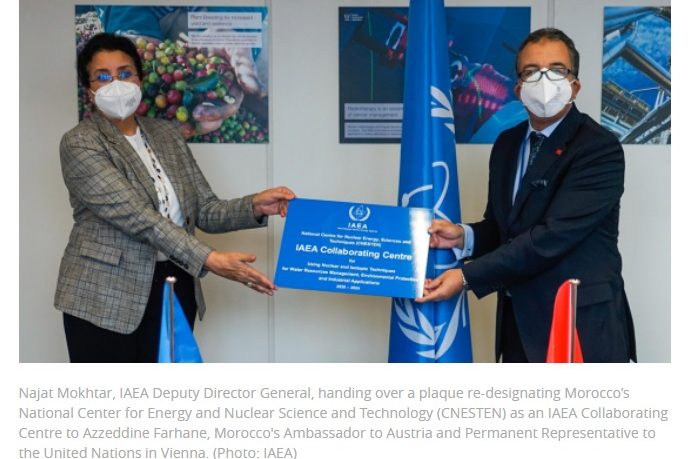Aleksandra Peeva, IAEA Department of Nuclear Sciences and Applications
Morocco’s National Center for Energy and Nuclear Science and Technology (CNESTEN) has become the first nuclear institution in Africa to work with the IAEA in more than one field of nuclear applications as a Collaborating Centre.
By signing an agreement last week, the two organizations are expanding their cooperation from water resource management to environmental protection and industrial applications.
“The IAEA and CNESTEN will work together to enhance national capabilities of IAEA Member States in applying radioisotopes and radiation-based techniques to support cleaner and safer industrial process management,” said Najat Mokhtar, IAEA Deputy Director General and Head of the Department of Nuclear Sciences and Applications, during the signing ceremony held virtually this week.
Radiation techniques are some of the most environment-friendly and cost-effective methods available in several research areas, which explains their growing popularity in industry. The work of the two organizations will focus on the use of non-invasive nuclear techniques, such as non-destructive-testing, radiotracers and sealed sources applications.
In the field of water resource management, the IAEA and CNESTEN will join efforts to promote the use of isotope hydrology tools both in Morocco and in the wider region including Africa and the Middle East. This involves establishing collaboration agreements with African institutions, which have a mandate in water resource management, as well as conducting trainings in analytical methods and applications of geochemical and isotope tools.
“The scientific and technical cooperation between CNESTEN and the IAEA has enhanced the use of nuclear technology in Africa. In the context of climate change and Africa’s growing population, nuclear applications will play even more important role in achieving greener industry, better environmental protection and improved availability and quality of water,” said Khalid El Mediouri, Director General of CNESTEN.
CNESTEN was first designated as an IAEA Collaborating Centre in 2015 and has since then supported the IAEA’s activities in water resource assessment and management by:
- conducting hydrological studies addressing key water availability and quality issues related to various aquifers and basins across Morocco;
- providing trainings to more than 60 IAEA Technical Cooperation counterparts in Africa;
- participating in IAEA-led proficiency tests;
- carrying out thousands of isotope analyses used in national hydrological studies and IAEA-supported projects.
“This agreement constitutes a significant milestone in the long-lasting IAEA-CNESTEN cooperation, and is yet another valuable opportunity to further strengthen our collaboration in enhancing the use nuclear and isotopic techniques in Africa,” said Ambassador Azzeddine Farhane, Permanent Representative of Morocco to the United Nations in Vienna, noting that the signing of the agreement occurs during the Moroccan presidency of the 64th session of the IAEA General Conference.
IAEA Collaborating Centres
To promote the practical use of nuclear technologies, the IAEA collaborates with designated institutions around the world. Through the Collaborating Centres network, these organizations in Member States can assist the IAEA by undertaking original research and development and training relating to nuclear science, technologies and their safe and secure applications. There are 46 active Collaborating Centres worldwide, with ongoing discussions in several countries to establish new Centres.







